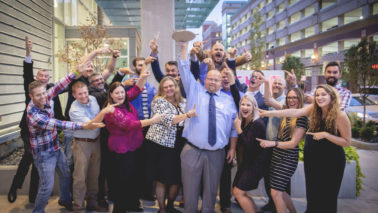Leadership Throughout COVID
At FZ, we believe that leadership is not a job title. Instead, it is an everyday commitment to serving and engaging with our employees while investing in their development. It is with this solid foundation that we can react nimbly to the ever-changing demands of COVID-19.
COVID-19 has certainly been a challenging and trying time for many. As leaders, it has demanded an increased intentionality around how we lead people through uncertain times. While we’re still maneuvering the outcomes caused by COVID, I’ve had some time to reflect on the lessons that I’ve learned—not always easily—over these past six months. I’ve compiled a list of best practices that can be adapted to any company, any team, or any leader. Now more than ever it is important that we are leading by example and making a positive impact on the lives of people.
Stay Flexible and Adapt
We can’t continue to do things the same way we’ve done them before—instead we need to stay open to change and adapt as needed. The systems, processes, and habits we create over the years sometimes become too engrained, and it takes an event like COVID to help us re-evaluate them.
Take meetings for example—I used to meet with my immediate team of managers weekly to prioritize, brainstorm, and offer feedback. When COVID hit and our team shifted to remote work, I realized that our communication rhythm needed to reflect the unease that was ensuing. We started meeting daily to gain stability and perspective on the ever-changing stream of information. As we began to collectively adapt to our new normal, we again adjusted our meetings to a bi-weekly schedule.
Though a small example, it shows how our processes ought to reflect current needs and how they can be easily changed to best fit what our people demand from us at a given time. So, what small changes can you make to help your team? Do they need more or less assistance? What do they need from you?
Recognize Emotions and Show Grace
Anxiety, distrust, stress, fatigue, discouragement, and complacency; these are all communal emotions that have been magnified throughout COVID. The reality is that our personal and professional lives have collided and are more intertwined than ever, creating more distractions and emotions within our teams. Caring for a high-risk loved one, maneuvering school closures, education from home, dealing with a spouse’s lay off—these are all situations that our people are living and working through. These heightened emotions lead to short fuses, which in turn can cause more drama and stress within the workplace. As leaders, we must help diffuse these situations and act as role models when it comes to having extra patience and giving each other the benefit of the doubt. This may be as simple as pausing to recognize the whole story while providing honest feedback. It may be extending a deadline or giving an extra chance to your colleagues. Whatever it is, show grace.
Be Intentional with Communication
It’s important that our teams hear from us—even when we don’t have it all figured out. Stay humble, stay honest, and be transparent with the information that you don’t know and the plans you do know. Acknowledge the fears, frustrations, and concerns that you and your team are feeling. Explain the big picture and show the small steps that you’re taking to get through challenging situations.
One thing that I’ve been doing throughout COVID is a monthly video check-in with my team. These videos are very authentic—just myself with my phone camera, taking 15 minutes to get our extended team on the same page. They allow me to answer questions, provide an update, and share encouragement. Simple, but effective in making sure that everyone across our West Michigan branches are in tune and informed on where we are going.
Recognize Emotions and Show Grace
Anxiety, distrust, stress, fatigue, discouragement, and complacency; these are all communal emotions that have been magnified throughout COVID. The reality is that our personal and professional lives have collided and are more intertwined than ever, creating more distractions and emotions within our teams. Caring for a high-risk loved one, maneuvering school closures, education from home, dealing with a spouse’s lay off—these are all situations that our people are living and working through. These heightened emotions lead to short fuses, which in turn can cause more drama and stress within the workplace. As leaders, we must help diffuse these situations and act as role models when it comes to having extra patience and giving each other the benefit of the doubt. This may be as simple as pausing to recognize the whole story while providing honest feedback. It may be extending a deadline or giving an extra chance to your colleagues. Whatever it is, show grace.
Be Intentional with Communication
It’s important that our teams hear from us—even when we don’t have it all figured out. Stay humble, stay honest, and be transparent with the information that you don’t know and the plans you do know. Acknowledge the fears, frustrations, and concerns that you and your team are feeling. Explain the big picture and show the small steps that you’re taking to get through challenging situations.
One thing that I’ve been doing throughout COVID is a monthly video check-in with my team. These videos are very authentic—just myself with my phone camera, taking 15 minutes to get our extended team on the same page. They allow me to answer questions, provide an update, and share encouragement. Simple, but effective in making sure that everyone across our West Michigan branches are in tune and informed on where we are going.
Solicit Honest Feedback
While we also focus on the importance of communication, we must be intentional about creating a feedback loop. Feedback is essential for growth and during these times it is the best way of staying in tune. With conversations and meetings becoming more formalized in remote work, it’s vital that we do not become disconnected from what our teams are feeling. Be deliberate about asking for feedback in order to gauge the general tone and emotions of the extended team. Be humble and ask, “What are we missing,” “Where are my blind spots,” and “How can I improve?”
At the end of my monthly videos, I always invite open feedback. Whether it’s an email, a text, or a phone call, I want to hear from the team. I’ve noticed over these past six months that the interaction and feedback I’ve received on my videos has increased and the criticism, questions, and comments have been helpful in how I plan and communicate going forward.
Get Out There
Even with the restrictions that COVID has put on us, it is important that we are getting out there and being present with our teams. Make it a priority to see people face-to-face when possible, while obviously abiding by current safety practices. For myself, I’ve had to prioritize getting out in the field and visiting job sites. Being present allows for feedback and conversations while also signaling to my extended team that I am engaged and aware of what they are experiencing.
While I’ve learned a lot during this season, I don’t have it all figured out. Change is clunky. Leading people is messy. Frankly, I've made many mistakes, but I've also learned through them and in doing so have become a better leader.
Here’s the silver lining of COVID and other challenging times: it provides us the opportunity to be tested and therefore strengthened. Our personal and professional growth is developed at a rapid rate. One thing is for sure—we are becoming better people and better leaders through these experiences.
So, stay flexible, keep learning, and most importantly—keep growing.






